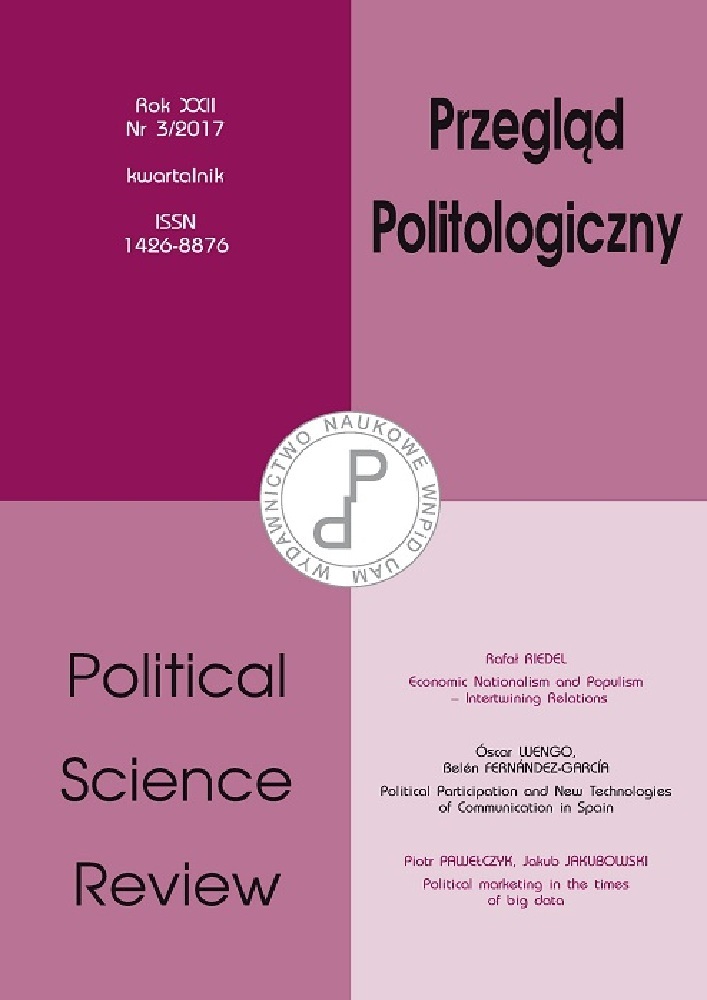Abstract
The objective of the paper is to analyse two very closely related categories, economic nationalism and economic populism. They intertwine both in the lived politics on the ground and in intellectual debates. Despite a rich interdisciplinary discourse, scholars interested in economic nationalism and economic populism still disagree not only how to explain them, but more fundamentally – about what they are and what their relation is. This paper answers this deficit by addressing the question of the intertwining connections between economic nationalism and populism. In the first instance it reconstructs the basic definitions of economic nationalism – its constitutive elements, its historicity and periodization as well as its main categorisations. The next section focuses on economic populism, it starts with reconstructing the general definitions of populism and then consequently emphasises its economic dimension. In the conclusive part, as well as in throughout the argumentation of whole text, the author highlights the relations between economic nationalism and populism, their overlapping components and elements that they do not share. The origins of populism (as a movement) were economic in nature. Economic populism (as an empty-hearted ideology) is intertwined with nationalism in many of its contemporary (re)incarnations. Both economic nationalism and populism are increasingly important due to their raising political popularity and they require a closer look and scholarly attention.
References
Aslanidis P. (2015), Is Populism an Ideology? A Refutation and a New Perspective, “Political Studies”, pp. 1–17.
Baughn C. C., Yaprak A. (1996), Economic Nationalism: Conceptual and Empirical Development, “Political Psychology”, no. 17 (4), pp. 759–778.
Berend I. (2000), The Failure of Economic Nationalism. Central and Eastern Europe Before World War II, “Revue economique”, no. 51 (2), pp. 315–322.
Berlin I. (1968), To Define Populism, “Government and Opposition”, no. 3 (2), pp. 137–197.
Black D. J. (1928), The McNary-Haugen Movement, “The American Economic Review”, no. 3, vol. XVIII, pp. 405–427.
Dornbusch R., Edwards S. (1991), The Macroeconomics of Populism in Latin America, Chicago.
Freeden M. (1998), Is Nationalism a Distinct Ideology?, “Political Studies”, no. 46 (4), pp. 748–765.
Gilpin R. (1987), The Political Economy of International Relations, Princeton.
Helleiner E. (2002), Economic Nationalism as a Challenge to Economic Liberalism. Lessons from the 19th Century, “International Studies Quarterly”, no. 46, pp. 307–329.
Wendy I.-M. (2011), National Identity and Economic Nationalism. Can an Economic Perspective Reinforce Nationalism and Nation Building?, “Africa Insight”, no. 41 (1), pp. 59–70.
Jansen S. R. (2011), Populist Mobilisation: A New Theoretical Approach to Populism, “Sociological Theory”, no. 29 (2), pp. 75–96.
Keane J. (1994), Nations, nationalism and citizens in Europe, “International Social Science Journal”, no. 4, pp. 169–184.
Kluknavska A. (2014), Enemies among us: The anti-elitist and xenophobic discourses in the Czech Republic and Slovakia, “Rexter – casopis pro vyzkum radikalismu, extremismu a terrorismu”, no. 2, pp. 42–71.
Kubik J. (2012), Illiberal Change to Liberal Democracy. The Case of Poland, “Taiwan Journal of Democracy”, no. 8 (2), pp. 79–89.
List F. (1904) The National System of Political Economy, translated by S. Lloyd, London.
Mielina I., Koroleva I. (2015), Supporters for far right ideology and anti-migrant attitudes among youth in Europe: A comparative analysis, “The Sociological Review”, no. 63 (2), pp. 183–205.
Moffit B., Tormey S. (2014) Rethinking Populism: Politics, Mediatisation and Political Style, “Political Studies”, no. 62, pp. 381–397.
Mudde C. (2001), In the Name of the Peasantry, the Proletariat and the People: Populism in Eastern Europe, “East European Politics and Societies” March, p. 33–53.
Mudde C. (2004), The Populist Zeitgeist, “Government and Opposition, no. 39 (4), pp. 542–543.
Mudde C., Kaltwasser C. (eds.) (2012), Populism in Europe and the Americas, Threat or Corrective for Democracy, Cambridge University Press.
Mueller J.-W. (2015), Parsing populism. Who is and who is not a populist these days?, “Juncture”, no. 22 (2), pp. 80–89.
Nakano T. (2004), Theorising economic nationalism, “Nations and Nationalism”, no. 10 (3), pp. 211–229.
Natvik G., Torvik R. (2016), Petro-Populism, “Journal of Development Economics”, no. 118, pp. 1–12.
Nicholson P. S. (2012), Who’s the Party of the People? Economic Populism and the U.S. Public’s Beliefs About Political Parties, “Political Behaviour”, no. 34, pp. 369–389.
Pereira B. L., Dall’Acqua F. (1991), Economic populism versus Keynes: reinterpreting budget deficit in Latin America, “Journal of Post Keynesian Economics”, no. 14 (1), pp. 29–38.
Pryke S. (2012), Economic Nationalism: Theory, History and Prospects, “Global policy”, no. 3 (3), pp. 281–291.
Rooduijn M., van der Burg W., de Lange S. (2016), Expressing or fuelling discontent? The relationship between populist voting and political discontent, “Electoral Studies”, no. 43, pp. 32–40.
Rupnik J. (2007), From Democracy Fatigue to Populist Backslash, “Journal of Democracy”, no. 18 (4), pp. 17–25.
Shulman S. (2000), Nationalist Sources of International Economic Integration, “International Studies Quarterly”, no. 44, pp. 365–390.
Srinivasan S. (2014), Economic populism, partial deregulation of transport fuels and electoral outcomes in India, “Energy Policy”, no. 68, pp. 465–475.
Stavrakakis Y. (2014), The Return of the “People”: Populism and Anti-Populism in he Shadow of the Europea Crisis.
Taggart P. (2004), Populism and representative politics in contemporary Europe, “Journal of Political Ideologies”, no. 9 (3).
Taggart P., Kaltwasser R. C. (2016), Dealing with populists in government: some comparative conclusions, “Democratisation”, no. 23 (2), pp. 345–365.
Weiss H. (2003), A Cross-National Comparison of Nationalism in Austria, the Czech and Slovac Republics, Hungary and Poland, “Political Psychology”, no. 24 (2), pp. 377–401.
Wills J. (2015), Populism, localism and the geography of democracy, “Geoforum”, no. 62, pp. 188–189.
